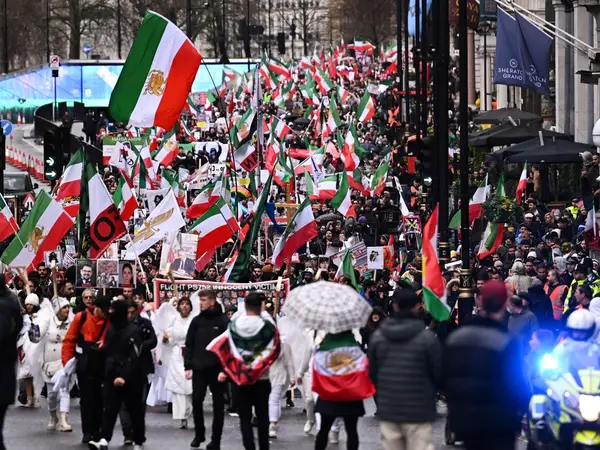A leading activist has urged Iranians to unite and put aside disputes over an “unreal” fear of dictatorship or Iran's dismemberment after the fall of the regime.
“Let’s not fear having a dictatorship in the future. Let’s not fear Iran's dismemberment. These fears are not real … Let’s agree on [our] minimum demands and dig the grave of this rotten corpse,” the Canada-based Hamed Esmaeilion wrote in an Instagram post Sunday.
He wrote the comment on the anniversary of Ayatollah Ruhollah Khomeini’s return from exile to Tehran in 1979 and the establishment of the Islamic Republic. The post has been liked by nearly 200,000 so far.
In his long commentary, Esmaeilion urged Iranians both inside the country and abroad to unite, whether republicans or monarchists, belonging to minority religious or ethnic groups, on the right of the political spectrum or on the left.
“Many of the mistakes of the past will not be repeated if we leave political disputes to after the toppling of the descendants of the demon [Khomeini],” he wrote adding that unreasonable arguments would only delay the waves of protests in Iran where people no longer fear fighting the regime.
Like the exiled prince Reza Pahlavi, activists Masih Alinejad, Nazanin Boniadi, and footballer Ali Karimi, many on social media have expressed support for Esmaeilion’s membership in an opposition council to be formed for transition from the Islamic Republic.
Last week, Prince Reza Pahlavi also urged pro-democracy forces to unite. “I’m extending my hand, once again, for cooperation to all pro-democracy forces, including individuals, parties and groups, to support the Iranian national revolution,” he said in a statement published via his social media accounts.
The exiled prince’s plea came soon after his supporters launched a campaign to endorse him as the trustee of the Iranian people in transition to secular rule. Over 433,000 have so far signed the petition launched in mid-January.
Esmaeilion and others have recently been under heavy fire on social media for not having joined the campaign to give power of attorney to the exiled prince. Critics of the campaign say it has played a divisive role, caused rifts among the opposition, and led to the cooling of the revolutionary fervor on the streets in Iran.
In his recent statement, the exiled prince set three preconditions for cooperation with others: Accepting to ensure Iran's territorial integrity and the people’s right to determine the form of the future political system through a free vote as well as belief in human rights-based secular democracy.
Some Kurdish, Baluch, Turkic speaking groups and individuals, and those supporting federalism, argue that the mention of territorial integrity is divisive and is a sign federalism will not be tolerated. Others, particularly supporters of the exiled prince say demanding federalism is only a cover for separatism and dismemberment of Iran.
In the past four months, protesters across the country, particularly in Kurdish and Baluchi cities, have often chanted slogans such as “From Baluchestan (or Kordestan) to Tehran, we sacrifice our lives for Iran” to repudiate claims of separatism and stress the unity of all Iranians against the regime.
Hundreds of thousands of Iranians welcomed a New Year message tweeted by Prince Reza Pahlavi, Alinejad, Karimi, Boniadi, and Esmaeilion as well as actress Golshifteh Farahani on December 31 in which these opposition figures had wished that further solidarity and organizing could make 2023 the last year of the clerical rule in Iran.
Many believed that the tweet heralded the formation of a revolutionary council in exile that could take on the role of leading the Iranian revolution in the absence of strong revolutionary political parties and leaders in the country.
